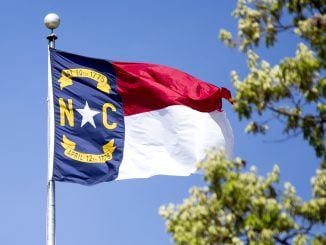
SNOW CAMP — A small community in southern Alamance County has seen a protracted battle over a proposed crushed-stone mine, with property rights and business interests clashing with environmentalist groups over what the new site would mean.
The county has little zoning oversight in its local government regulations, so after a routine application process, Alamance Aggregates was given the county’s approval to start a mine, pending final approval by the state. This process happened without much notice by commissioners or the community — at first.
Months later, environmentalists connected to a multistate network, known as the Blue Ridge Environmental Defense League, opened a local chapter, called “No Snow Camp Mine,” focused solely on preventing the mine project from proceeding.
“They’ve tried everything,” Alamance Aggregates’ attorney Thomas Terrell told NSJ, saying the anti-mine group has tried to impose a noise ordinance, challenged the county’s definitions of bodies of water, placed one of the group’s leaders on the planning board to draft new regulations on heavy industrial projects in the county, and have spread information that Terrell says is “fabricated.”
Any Alamance County Commission meeting that touches on the issue will also have a large turnout for public comment. A common theme is that the water will be impacted by the mine.
One member of the public who commented at a November meeting of the commission, Jimmy Benton, said he bought land in Snow Camp and was going to retire to it, but he has put those plans on hold because he’s worried that his land, which is around half a mile away from the proposed mine, would be affected, especially his pond.
“This pond is almost completely spring-fed,” Benton said. “I feel it would be impossible not to impact our springs with the quarry pulling 500,000 gallons of water a day out of the aquifer.”
The claim that the mine would use hundreds of thousands of gallons of water a day, emptying local water resources, is an example of what Terrell says is misinformation being spread.
“They have twisted multiple factual statements made by Alamance Aggregates to make it sound like we’re going to be pumping a half a million gallons of water from local wells every single day,” Terrell told NSJ in response. “All we’ve asked for is when there is a monster rainstorm, to be able to pump up to that amount of water each day out of the pit.”
He said, even in these extreme cases, the water pumped out of the quarry would find its way back into the water table, so it wouldn’t drain the water table.
The mine, which does not yet have state approval, would pursue “aggregate” stone, which are gray crushed stones often used in construction of roads and buildings. Terrell says these mines are “everywhere,” even hidden in residential areas, like a large one within the Greensboro city limits. According to him, there is “zero” environmental risk from this type of project if basic regulations are followed.
Gary Ulicny, a recently retired Atlanta medical director who now resides in Snow Camp, is a main organizer, along with Bill and Donna Poe, of the mine opposition, which has been able to gather a significant following. At a Dec. 4 public hearing at Sylvan Elementary School in Snow Camp, 226 people signed up to speak about the mine, Zaynab Nasif, a North Carolina Dept. of Environmental Quality public information officer, told NSJ.
“The residents of Snow Camp are vehemently opposed to the proposed mine being built in the community, and we are bewildered by what appears to be a bias in favor of the company that proposed this project,” Ulicny said at a late 2019 commission meeting.
Ulicny went on to name multiple issues he believed should disqualify the mine project from advancing, concluding, but “to no one’s surprise, the county investigation found no violations.”
Others opposed to the mine spoke, saying they believed the air quality could suffer, the water would be polluted, or it will be too noisy.
In support of the mine, Henry Vines, a farmer with land in Snow Camp and Burlington, said he had concerns about property rights and how creating rules after the fact to chase out a business might harm the local economy.
“So many things that we have to have in our society, we want them, but just not in our backyard. But they’ve got to be somewhere,” Vines said. “What kind of message are we sending to other industries with these kinds of restrictive requirements?”
Vines, a farmer, said he worried about a day when more newcomers arrive and would want to get rid of chicken houses in their neighborhood because they think it affects their property values.
It is unclear when the mine might be allowed to proceed. Terrell said Alamance Aggregates is “in the later stages of the process,” but they are still waiting on the state permit.
Asked when or if this permit from the state may be approved, Nasif said, “At this point, there is no timeline,” and that DEQ’s Division of Energy, Mineral and Land Resources “is still gathering comments.”
Nasif added: “Historically, we’ve always seen a lot of community engagement when new mines or facilities are being built. I can’t speak to why this specific one would garner more attention than others.”




